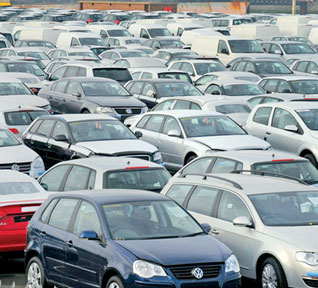Japanese crisis affects auto industry
Lalin FERNANDUPULLE
The auto industry worldwide has been disrupted triggered by the
Japanese earthquake and tsunami which washed away manufacturing plants
and large swaths of industrial land in the techno-rich country.
Japan is the second largest exporter of cars in the world and the
main supplier to the US car market. The devastation to manufacturing
plants is expected to affect global automobile sales.
 Chairman, Ceylon Motor Traders Association, (CMTA) Tilak Gunasekera
said that vehicle imports from Japan have been affected in a small way
and added that it would take two-three months to recover. Chairman, Ceylon Motor Traders Association, (CMTA) Tilak Gunasekera
said that vehicle imports from Japan have been affected in a small way
and added that it would take two-three months to recover.
The bulk of Sri Lankan vehicle imports are from Japan. Toyota,
Nissan, Mitsubishi and Suzuki are some of the Japanese brands in the
local market.
Gunasekera said that there is a short supply of vehicles to the
market due to the crisis in Japan. There would be a delay in the arrival
of shipments. “A few production lines have commenced operations but not
in full capacity. We hope that within a couple of months the situation
will be normal”, he said.
The crisis in Japan is expected to hit vehicle buyers badly and
manufactures such as Toyota and Honda will lose billions of dollars as
several auto plant workers have been told to stay home till the
situation improves.
Disruptions to power supply, transportation and other logistics are
delaying the resumption of work in industries. Experts believe that the
situation would get worse with the crisis in Japan and the Middle East.
Gunasekera said that there would be a delay in resuming work at auto
plants till the production of spare parts commences.
“The local vehicle market has grown during the past two years
following the duty reduction that offered huge incentives to buyers”, he
said.
“There is a 60 percent growth in the auto market during the first
three months this year compared to the same period last year. Sales of
brand new vehicles increased at a rapid pace”, the CMTA chairman said.
According to the Registry of Motor Vehicles 9,000 cars were
registered last year and in the previous year 5,700, a 60 percent growth
in sales.
The number of motorbikes registered last year was 195,000 while in
2009 it was 135,000, a 44 percent growth. Sale of trucks dropped last
year compared to the previous year. Chairman, Ideal Motors (Pvt) Ltd.,
Nalin Welgama said top vehicle manufacturers such as Toyota and Nissan
have stopped production temporarily but hope to recommence within a
month.
“There is a temporary shortage of vehicles from the Japanese market
but the situation will be normal within a couple of months”, Welgama
said.
Senior General Manager-Sales and Distribution Automotive, Associated
Motorways (Pvt) Ltd., Shivantha De Zoysa said vehicles placed for March
production and onwards will delay. However the exact impact is yet being
assessed by their Japanese principals.
“There would be a delay in spare parts shipments although so far the
impact has been minimal. There will not be a long term impact on the
vehicle market”, he said.
De Zoysa said that the number of new and used motorcars registered
during December last year was almost the entire registrations during
2009.
“Sales of motorcars, three-wheelers and commercial vehicles have
increased.
The auto market growth was further fuelled by the duty benefit given
to hybrid cars in the budget” he said.
Sri Lanka’s vehicle market was stagnant for years due to the
staggering import duty which was almost 300 percent and one of the
highest in the world.
The government reduced the duty last year as an incentive for more
vehicle imports and to increase revenue to its coffers.
Sri Lanka imports cars, three-wheelers, motorbikes and commercial
vehicles from India.
Tata, Maruti and Bajaj are some of the Indian vehicles in Sri Lanka.
|

